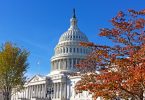Republican members of the U.S. House Financial Services Committee have sent a letter to federal banking regulators requesting the reversal of policies they claim have impeded financial innovation in digital assets. The letter, addressed to the Chairs or Acting Chairs of the Federal Reserve, FDIC Chairman and OCC, comes after both the OCC and FDIC have already rescinded interpretive letters. The FDIC’s withdrawal was days before the Congressional letter was sent.
The digital assets letter was one of several sent to regulators, including the SEC, asking them to rollback moves under the Biden administration.
The digital assets letter specifically calls on the Federal Reserve to rescind two supervisory letters. The first requires Board supervised banking organizations to notify the Federal Reserve prior to engaging in digital asset activities, while SR 23-8 established a supervisory non objection process for state member banks involved with tokens using distributed ledger technology. The Congressional members argue these requirements impose “unnecessary supervisory burdens” and have functioned as barriers rather than guardrails.
Committee members noted that the Federal Reserve’s current approach contradicts current efforts to enable financial institutions to participate in the stablecoin ecosystem. They characterized the supervisory non objection process as a method to “stonewall financial institutions” and restrict their ability to engage with blockchain technology.
Recent Freedom of Information disclosures by the FDIC support their assertion. Documents released following litigation by Coinbase showed that banks were not merely required to seek permission but were actively discouraged from engaging in cryptocurrency related activities as well as blockchain transactions that did not involve cryptocurrency.
The letter from Chairman French Hill and other committee members reflects concerns by the Republican party that current regulatory frameworks are preventing U.S. financial institutions from competing in the digital asset space, limiting economic opportunities for Americans.






